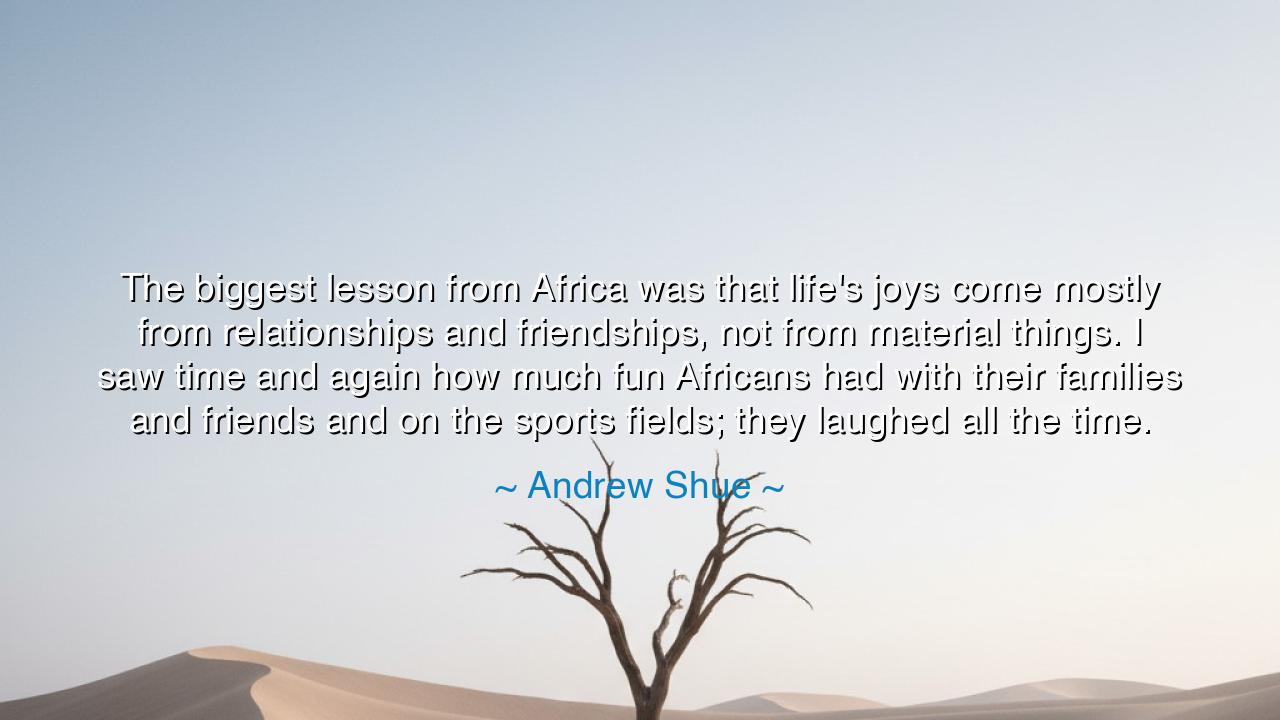
The biggest lesson from Africa was that life's joys come mostly
The biggest lesson from Africa was that life's joys come mostly from relationships and friendships, not from material things. I saw time and again how much fun Africans had with their families and friends and on the sports fields; they laughed all the time.






Hear now the words of Andrew Shue, who looked upon the great continent of Africa and drew forth a truth that is as old as humanity itself: “The biggest lesson from Africa was that life's joys come mostly from relationships and friendships, not from material things. I saw time and again how much fun Africans had with their families and friends and on the sports fields; they laughed all the time.” These words shine like a beacon, for they remind us that the treasures of life are not measured in gold or possessions, but in the warmth of fellowship, the strength of kinship, and the unquenchable fire of shared laughter.
The meaning of this quote lies in the revelation that relationships are the true wealth of life. Where others may chase jewels, power, or luxury, Shue witnessed communities who found happiness in one another, who discovered abundance in friendship and joy in simple games upon the sports field. He saw laughter springing not from riches but from hearts joined together. In this way, he unmasked the great deception of modern life—that material things can satisfy the soul. True fulfillment, as he learned, flows not from possessions but from connection.
This truth is written across history. Consider the tale of Socrates, who owned almost nothing, yet was rich in companions and discourse. He walked barefoot through Athens, engaging with friends and strangers alike, and declared that the greatest wealth is not silver or gold, but virtue and friendship. His joy lay not in objects, but in people—in the communion of souls. His life mirrors the lesson Shue learned in Africa: possessions fade, but relationships endure.
Think also of Nelson Mandela, who after twenty-seven years in prison emerged not with bitterness but with a spirit still overflowing with laughter, humility, and love for his people. He did not possess wealth during his captivity, but he possessed friendships, solidarity, and the dream of reconciliation. From this strength, he built a new South Africa. Mandela’s story is proof that joy can live even in hardship when hearts are bound together in unity.
The origin of Shue’s insight comes from his own life spent not only in acting, but in playing professional soccer in Zimbabwe. There, amid fields far from the wealth of the Western world, he discovered that happiness thrives not in mansions but in villages, not in possessions but in play, not in solitude but in community. Watching the laughter of children on the sports fields and the joy of families gathered together, he understood that this was the true essence of life.
The lesson for us is clear: we must resist the lure of materialism that blinds us to the riches of the heart. We must learn to cherish our friendships, to honor our families, and to seek joy not in what we own but in what we share. A meal with loved ones, a game played in the sun, laughter echoing among friends—these are treasures more lasting than any jewel. To neglect them is to live in poverty, even amid riches.
Therefore, O listeners of tomorrow, let this teaching be your guide: invest not only in wealth but in people. Build bonds of love and friendship. Choose to spend your time not chasing possessions but nurturing relationships. For when the final day comes, it will not be gold or silver that fills your heart with warmth, but the memory of laughter shared, of friendships lived, of family embraced.
So let Shue’s words echo as wisdom eternal: joy is found not in material things, but in human connection. Seek not to fill your hands, but to fill your heart. Laugh with others, love deeply, and you shall discover a wealth that no thief can steal and no time can erode.






AAdministratorAdministrator
Welcome, honored guests. Please leave a comment, we will respond soon